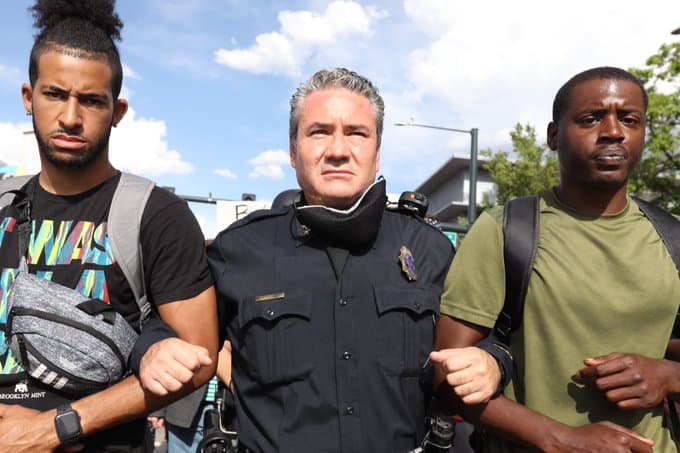A day after Denver Police Chief Paul Pazen said he would implement reforms in a report about his department's response to protests of racism and police brutality, Denver City Council and advocates for police reform gave their two cents.
City Councilman Paul Kashmann, who heads council's safety committee, called the findings by the Office of the Independent Monitor, the city's police watchdog, "chilling."
"This was not simply a situation of 'Oh well, stuff happens,'" Kashmann said. "There were serious missteps and lack of preparation in the ways DPD handled these demonstrations. I recognize the challenges involved in mass gatherings, but this is the agency we rely on to keep the peace in all situations."
Independent Monitor Nick Mitchell's report, released Monday, found that the Denver Police Department was unprepared and acted dangerously during this summer's protests sparked by the killing of George Floyd. Many officers acted anonymously -- records of their work do not exist -- and failed to activate their body cameras, obscuring who is accountable for misconduct like unnecessary violence against the public.
On behalf of the Denver Police Department, Pazen accepted over a dozen recommendations from Mitchell, who city council asked to create the report. The reforms range from banning certain weapons in crowds to new training to documentation requirements. The department will create an online dashboard to track progress, Pazen said.
"I do take accountability and responsibility for our department's actions," Pazen said Tuesday, adding that the department "will use this report to improve."
Councilwoman Candi CdeBaca, council's most outspoken critic of DPD, called the report "validating."
Still, she and some of her colleagues asked Mitchell for direction on policies to increase transparency and accountability in the future. For example, DPD did not give the independent monitor access to its Evidence.com portal, which would have let Mitchell sift through all of the department's body camera footage. Instead, DPD chose which videos to provide, Mitchell said.
"Frankly, I think we should" have access, Mitchell told the council.
Apryl Alexander, who sits on a mayoral-appointed watchdog group known as the Citizen Oversight Board and is a leader of Black Lives Matter 5280, said the report affirmed what people who experienced and witnessed unnecessary violence at the hands of police have been saying all along. She also questioned the effectiveness of DPD's approach to reform.
"With so many different policies, including policies related to policing, we are reactionary instead of taking proactive approaches," Alexander told Denverite.
The 16 crowd-control reforms Pazen committed to are the latest reforms DPD has or will implement in response to events involving police violence. For example, the department banned chokeholds following Floyd's death -- and over a week of protests.
Alexander also questioned how officers who remain anonymous will be held accountable for DPD's response to the summer's protests. On Tuesday, Pazen would not commit to asking unidentified officers suspected of wrongdoing to come forward.
"I think that's the most disappointing part of this report, is that for those individuals who were directly targeted or injured, there will be no justice," Alexander said.
Vinnie Cervantes, who served as a medic for the Denver Alliance for Street Health Response during the protests, said he appreciated the report, but only to an extent. He said the recommendations amounted to "encouragement to reevaluate certain policies or procedures," but he would have liked to have seen outright orders for these practices to stop -- something the independent monitor cannot enforce.
"I think the reporting the OIM has done speaks to the fact that it needs more oversight, more accountability over the police, and more power to influence changes within the department," said Cervantes, who has been part of the police reform movement for years.
CdeBaca and Alexander both questioned DPD's contract for new body cameras, approved Monday by the city council, given that so many officers did not use them this summer despite the requirement to do so. The new cameras will automatically start recording when an officer draws a gun or taser, but in other scenarios, the decision to record is left up to the officer.
City Councilwoman Robin Kniech said she was interested in getting policy direction around police officers targeting journalists. Mitchell said investigations into those claims aren't done yet.
Pazen will appear before the council's safety committee for a hearing later this month.
"This is the beginning of an important and continuing discussion," Kashmann said. "So I would hope to have (Chief Pazen) back a number of times to talk about the progress."
This article was updated to correct the title of Apryl Alexander, who is a leader of BLM 5280 but not the organization's executive liaison.












